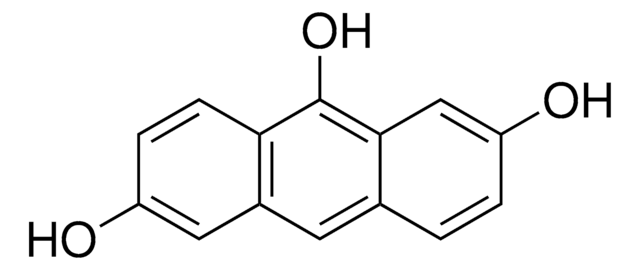D2773
Dithranol
≥90% (HPLC)
Synonym(s):
1,8,9-Anthracenetriol, 1,8-Dihydroxy-9(10H)-anthracenone, 1,8-Dihydroxyanthrone, Anthralin
About This Item
Recommended Products
Quality Level
Assay
≥90% (HPLC)
form
solid
mp
178-181 °C (lit.)
solubility
chloroform: 20 mg/mL, clear to very slightly hazy, yellow
SMILES string
Oc1cccc2Cc3cccc(O)c3C(=O)c12
InChI
1S/C14H10O3/c15-10-5-1-3-8-7-9-4-2-6-11(16)13(9)14(17)12(8)10/h1-6,15-16H,7H2
InChI key
NUZWLKWWNNJHPT-UHFFFAOYSA-N
Gene Information
mouse ... Alox12(11684)
Looking for similar products? Visit Product Comparison Guide
General description
Application
Other Notes
Signal Word
Warning
Hazard Statements
Precautionary Statements
Hazard Classifications
Eye Irrit. 2 - Skin Irrit. 2 - STOT SE 3
Target Organs
Respiratory system
Storage Class Code
11 - Combustible Solids
WGK
WGK 3
Flash Point(F)
Not applicable
Flash Point(C)
Not applicable
Personal Protective Equipment
Choose from one of the most recent versions:
Already Own This Product?
Find documentation for the products that you have recently purchased in the Document Library.
Customers Also Viewed
Our team of scientists has experience in all areas of research including Life Science, Material Science, Chemical Synthesis, Chromatography, Analytical and many others.
Contact Technical Service
![trans-2-[3-(4-tert-Butylphenyl)-2-methyl-2-propenylidene]malononitrile matrix substance for MALDI-MS, ≥99.0% (HPLC)](/deepweb/assets/sigmaaldrich/product/structures/249/587/f8021369-f65a-413d-887d-3c8a4d2a248f/640/f8021369-f65a-413d-887d-3c8a4d2a248f.png)










